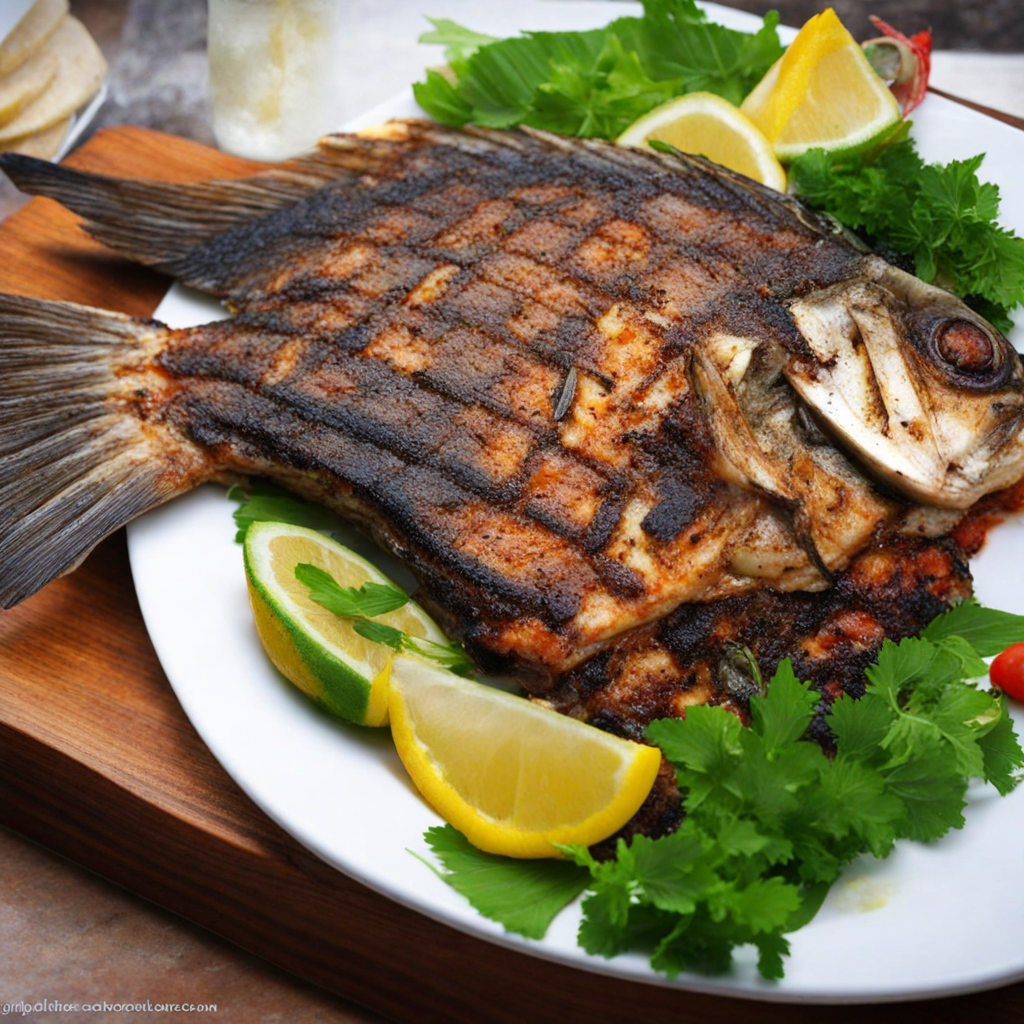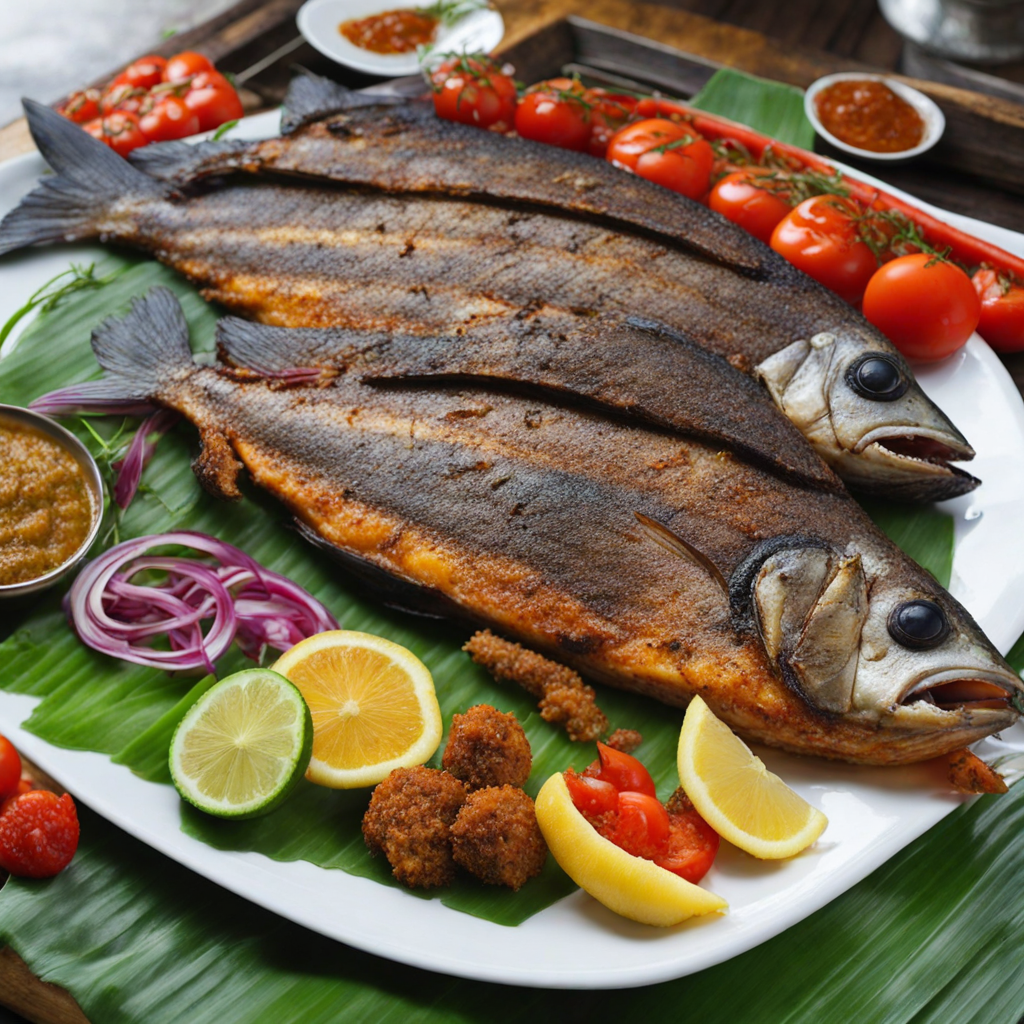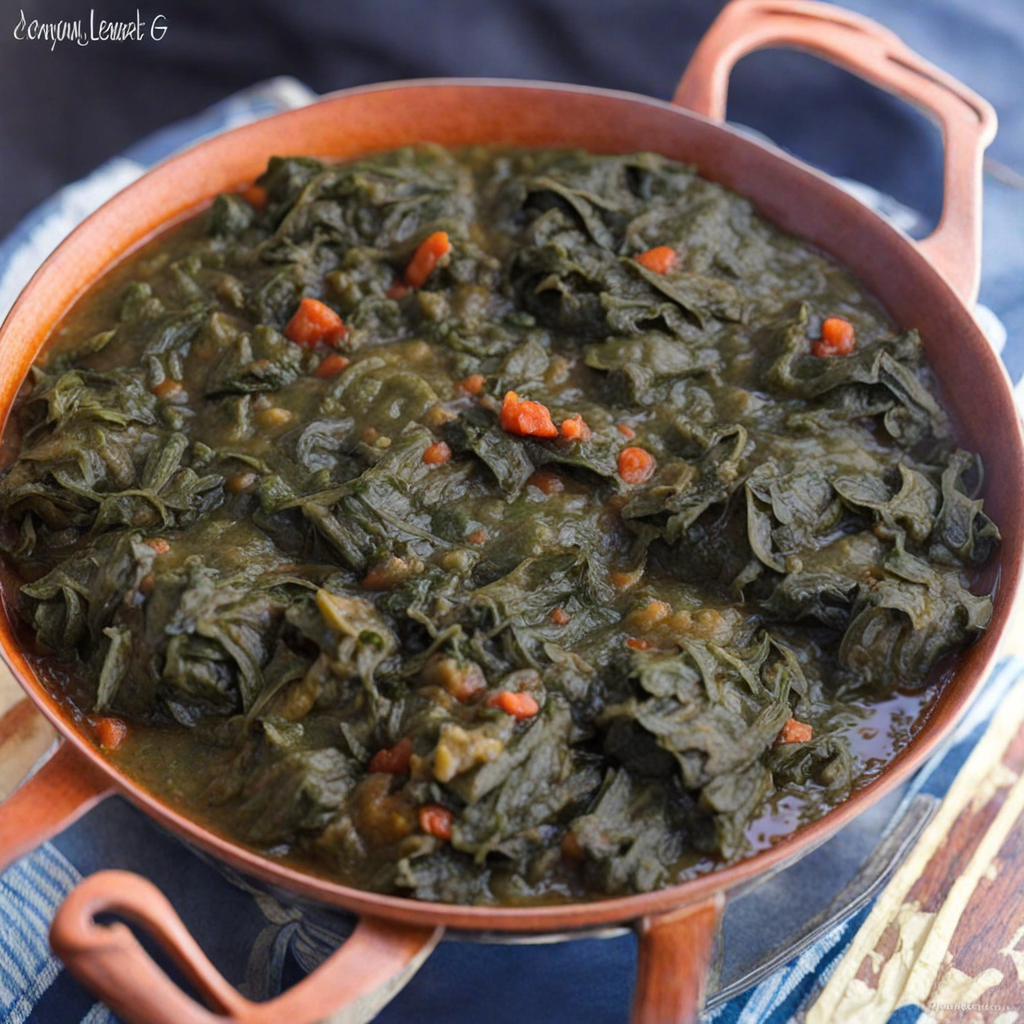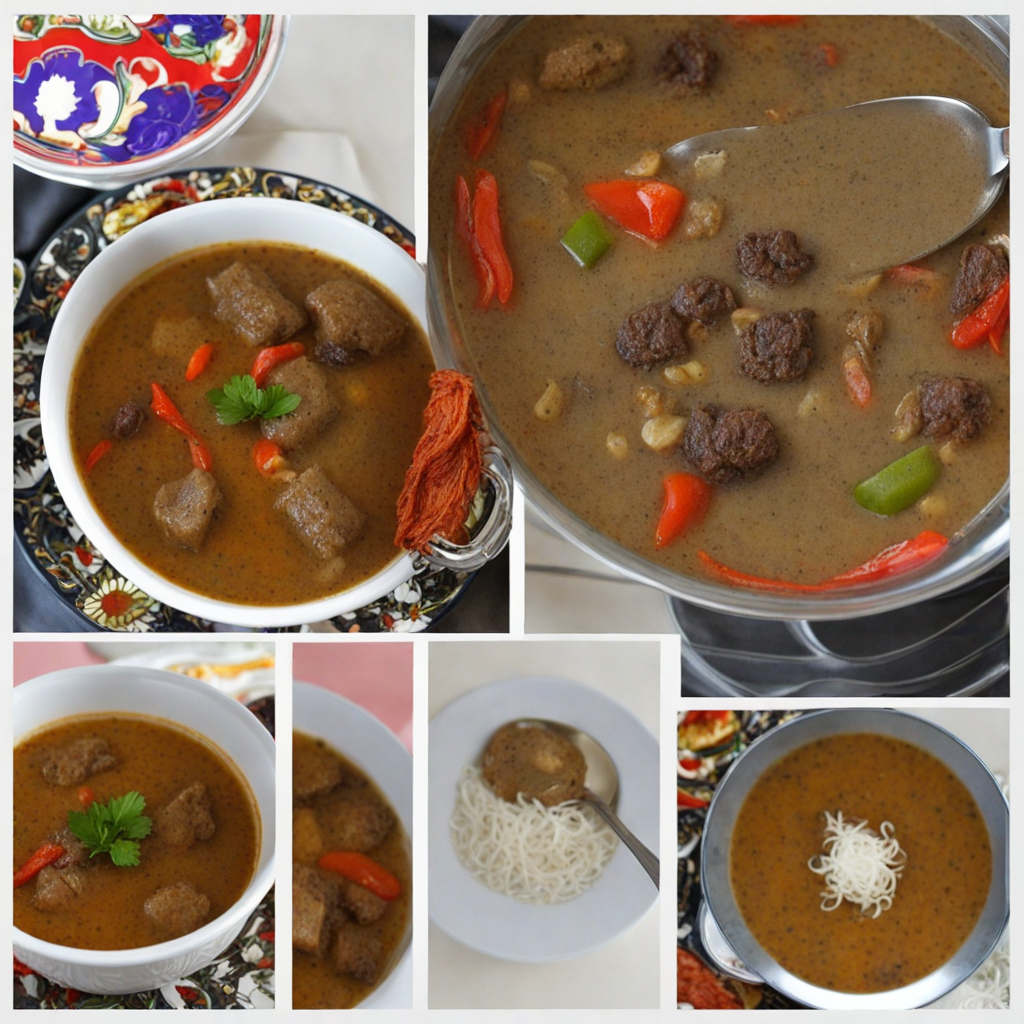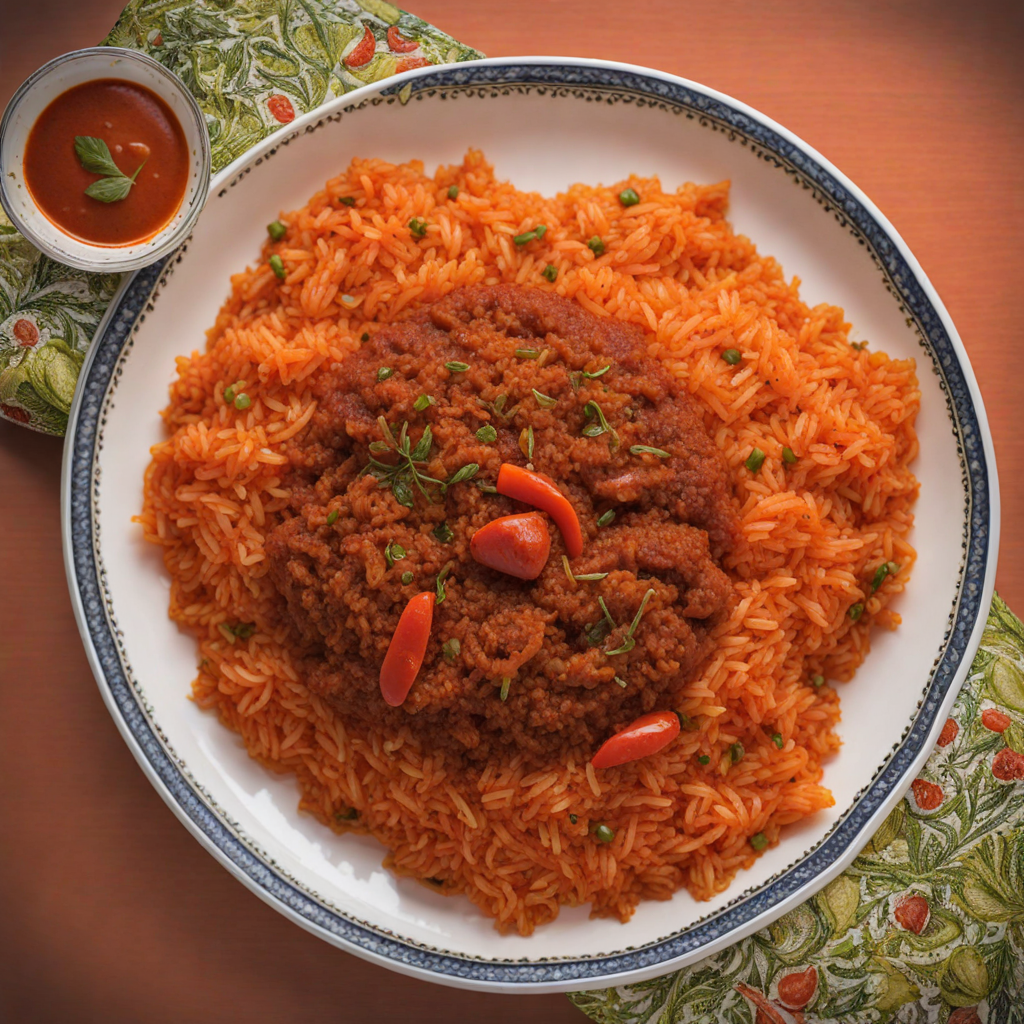Grilled Fish
Grilled fish, a cherished dish in Equatorial Guinea, offers a unique and delightful taste experience that reflects the country's rich culinary heritage. The fish is typically marinated with a blend of local spices, including garlic, chili, and lemon, which enhance its natural flavors while adding a vibrant kick. The grilling process imparts a smoky aroma that beautifully complements the tender, flaky texture of the fish, making each bite a celebration of taste. The choice of fish varies, with options like tilapia or snapper being popular, ensuring freshness and quality in every dish served. The presentation of grilled fish is often accompanied by a variety of colorful sides, such as fried plantains, rice, or a fresh vegetable salad. Each component is thoughtfully prepared to elevate the meal, creating a harmonious balance of flavors and textures on the plate. The combination of the savory grilled fish and the sweetness of plantains creates a mouthwatering contrast that excites the palate. Additionally, a drizzle of spicy sauce or a squeeze of lime can add an extra layer of zing, allowing diners to customize their experience according to their taste preferences. Enjoying grilled fish in Equatorial Guinea is more than just a meal; it’s an invitation to savor the local culture and tradition. Often enjoyed in a communal setting, the dish brings people together, fostering a sense of connection and celebration. The experience is enhanced by the warm hospitality of the locals, who take pride in sharing their culinary treasures. For anyone looking to explore new tastes, grilled fish from Equatorial Guinea promises a flavorful journey that is both satisfying and memorable.
How It Became This Dish
A History of Pescado a la Parrilla in Equatorial Guinea Pescado a la parrilla, or grilled fish, is not just a culinary delight in Equatorial Guinea; it embodies the nation’s rich cultural heritage and reflects the intersection of indigenous practices, colonial influences, and the bounty of its coastal geography. To understand this iconic dish, one must delve into the historical, cultural, and environmental tapestry of Equatorial Guinea. #### Origins: The Coastal Bounty Equatorial Guinea, located on the west coast of Central Africa, boasts a diverse ecosystem that includes lush rainforests and a long coastline along the Atlantic Ocean. This geography has historically provided a wealth of resources, particularly fish. For centuries, local communities have depended on the ocean for sustenance, fishing for various species that inhabit the rich waters. Indigenous groups, including the Bantu-speaking people, have long engaged in fishing practices that date back thousands of years. Their methods were often sustainable, utilizing traditional techniques passed down through generations. The fish they caught formed the backbone of their diet, complemented by local staples such as cassava, plantains, and yams. Grilling fish over an open flame became a common cooking method, allowing the natural flavors of the sea to shine while infusing the dish with a smoky aroma. #### Colonial Influences The arrival of European colonizers in the late 19th century brought significant changes to the culinary landscape. Spain claimed Equatorial Guinea as a colony in 1778, and by the late 1800s, the islands of Bioko and the mainland region of Río Muni were firmly under Spanish control. This period introduced European ingredients and cooking techniques to the local population, influencing traditional practices. The blending of Spanish and local cuisines is evident in Pescado a la parrilla. While grilling fish was already a well-established method among the indigenous people, the introduction of spices such as paprika and the use of marinades became more common as Spanish culinary techniques melded with local traditions. The combination of these influences gave rise to a more complex flavor profile, as grilled fish could now be seasoned with a variety of herbs, spices, and even citrus, enhancing its appeal. #### Cultural Significance In Equatorial Guinea, food is more than mere sustenance; it is an essential part of social life and cultural identity. Pescado a la parrilla holds a special place in local cuisine, often served during communal gatherings, celebrations, and family feasts. The act of grilling fish is not only about preparing a meal but also about bringing people together, fostering community bonds, and honoring the traditions of the past. The dish is typically accompanied by side dishes that reflect the country's agricultural produce. Common accompaniments include fried plantains, yuca, and a fresh tomato salad, creating a colorful and diverse meal. Moreover, the presentation of Pescado a la parrilla often involves a communal aspect, where the fish is served whole, inviting diners to participate in the experience of sharing and enjoying the meal together. #### Development Over Time As Equatorial Guinea navigated the complexities of independence in 1968, the culinary scene continued to evolve. National pride and a renewed interest in local ingredients led to a resurgence in traditional cooking practices. Pescado a la parrilla, with its deep roots in the country’s history, became emblematic of this cultural revival. Chefs and home cooks alike began to explore the diversity of fishing practices and regional fish species, experimenting with different grilling techniques and flavors. Today, Pescado a la parrilla can be found in various forms throughout the country, from rustic roadside stalls to upscale restaurants. The dish has also gained international recognition, with chefs incorporating it into their menus to showcase the flavors of Equatorial Guinea. This exposure has led to a growing interest in Equatorial Guinean cuisine, as food enthusiasts and travelers seek to experience the authentic tastes of the nation. #### Modern Variations and Global Influence With globalization, Pescado a la parrilla has undergone adaptations that reflect changing tastes and ingredient availability. In urban areas, one might find fusion variations that incorporate influences from other African cuisines, as well as from Mediterranean and Caribbean dishes. Grilled fish tacos, for instance, have become popular, combining traditional grilling methods with contemporary presentation and flavors. Moreover, the emphasis on sustainable fishing practices has gained traction in recent years. As awareness of environmental issues increases, there is a growing movement among local fishermen and chefs to prioritize sustainability in their practices. This shift not only preserves the ocean’s resources but also ensures that Pescado a la parrilla remains a beloved dish for generations to come. #### Conclusion Pescado a la parrilla is a dish steeped in history, representing the rich cultural tapestry of Equatorial Guinea. From its indigenous roots and colonial influences to its modern adaptations, it tells the story of a nation that has embraced its culinary heritage while evolving with the times. This grilled fish, served with love and laughter, continues to be a symbol of community, tradition, and the enduring connection between the people of Equatorial Guinea and their natural environment. As the world becomes more interconnected, Pescado a la parrilla stands as a testament to the power of food to transcend boundaries and unite people in the appreciation of flavor, culture, and history.
You may like
Discover local flavors from Equatorial Guinea


